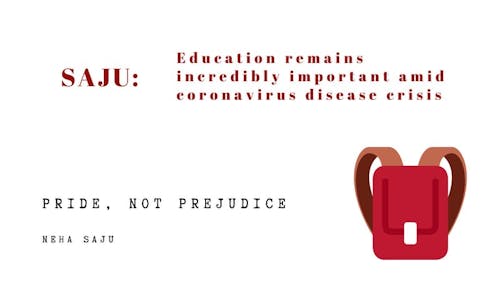SAJU: Education remains incredibly important amid coronavirus disease crisis

The security of a nation depends on the knowledge of its citizens, as education is the foundational aspect of society. Protecting the safety of American citizens has often surpassed other social and economic values, but the conservation and cultivation of educational practices must remain central to transform security measures according to the unpredictability of a changing world.
Educational services cannot come at the cost of maintaining public security since the acquisition of knowledge is one of the only safeguards against looming uncertainties, especially during a pandemic. Rather, the United States must invest in modernizing distance learning and devote supplies to struggling families.
The spread of coronavirus disease (COVID-19) has affected people across America to varying degrees, but one vulnerable population currently at home is school children. Millions of children across America are unsure about how they will begin the process of distance learning when the vast majority of American school systems are ill-equipped to handle this sudden shift.
The pandemic’s disparate impact has revealed that access to technology, which transformed digital conveniences to daily essentials, threatens the security of countless students across the world.
In order to feel secure during these historical times, access to education must be protected in order to maintain a sense of normalcy and intellectually develop students to face whatever the future holds. Preserving a semblance of normalcy is essential to calm panic and preserve hope for the future, as hysteria is a major security risk.
Moreover, the inability to attend school challenges the health of a student. 22 million students depend on a free or reduced-price school lunch as the main source of their daily nutrition. School lunch, especially for low-income students, is critical for a student’s well-being, according to the School Nutrition Association.
Unlike any other emergencies, the COVID-19 pandemic has exposed the lack of support, resources and care for the most vulnerable populations in American society: Single parents are especially struggling, some having to choose between giving up a job that pays the bills or leaving a child home by themselves.
While staying home is a crucial step toward curbing the effect of the virus, this alone cannot guarantee the well-being of an individual since no child will feel secure when they are hungry and alone.
This is why it is so important to make sure that children stay in school remotely, even during times of crisis. It is the responsibility of the government to finance comprehensive systemic change to compensate for the diminishing resources available to students.
For example, as public libraries around the nation close, the government must offer alternative learning resources for the children who cannot afford homeschooling materials.
Currently, the United States government spends 6.28 percent of discretionary spending on education. For comparison, 53.71 percent is spent on military funding (of the total spending budget, but education received 2.68 percent while the military got 33.28 percent).
The allocation of funding speaks to the values of a nation, and (especially in times of crisis) it is required that funding is reallocated to protect the most vulnerable in our country and necessitate security for school children.
For students in college, who are far more equipped than school children to handle the shift to online learning, there are still significant roadblocks that may hinder their access to online classes. A lack of access to technology for low-income students is a paramount concern.
While remote education, in this current form, is the key to continuing education for the near future, it must be considered that less proficient students are the most in need of skilled classroom teachers.
For those already entering the class with high grades or significant college preparation in their high school years, online learning formats can be a terrific option. Colleges must research how to better support academically challenged students in an online format.
While Rutgers is offering a pass/no credit option this semester (and other colleges are following suit in a similar or identical system), transforming the effectiveness of online learning should be a more focused issue in higher education.
As more of our society shifts to online platforms and services, education cannot fall behind in this movement. Classroom learning is still the cornerstone of education, but transforming this trusted method into a more computer-friendly format could be essential in addressing questions about access and privilege in education.
It will fall on the shoulders of today’s youth to one day reform public health preparedness plans, transform the resources available to vulnerable populations, create a system where we can prepare for disaster long before it strikes and advance the country in its educational practices. American society will enter a far more dangerous bind if we neglect to support and educate the future leaders of our nation.
Neha Saju is a School of Arts and Sciences sophomore planning on majoring in political science and history and minoring in English. Her column, "Pride, Not Prejudice," runs on alternate Fridays.
*Columns, cartoons and letters do not necessarily reflect the views of the Targum Publishing Company or its staff.
YOUR VOICE | The Daily Targum welcomes submissions from all readers. Due to space limitations in our print newspaper, letters to the editor must not exceed 900 words. Guest columns and commentaries must be between 700 and 900 words. All authors must include their name, phone number, class year and college affiliation or department to be considered for publication. Please submit via email to [email protected] by 4 p.m. to be considered for the following day’s publication. Columns, cartoons and letters do not necessarily reflect the views of the Targum Publishing Company or its staff.



